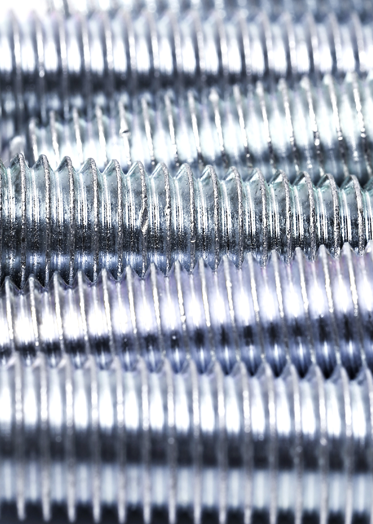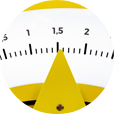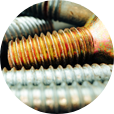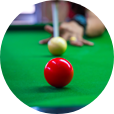Finding Your Perfect Balance: How to Choose the Right Pool Cue Weight

The perfect billiards shot is a harmonious blend of skill, precision and equipment. Among the crucial factors influencing your performance, the weight of your pool cue is vital. Whether you're a seasoned player or a budding enthusiast, discovering the ideal pool cue weight is your key to unlocking precision on the felt.
In this guide, we'll share the factors to consider when choosing the right pool cue weight. Join us as we explore the science, strategy and impact of cue weight selection, empowering you to find that perfect balance for your playing style.
The Science Behind Pool Cue Weights
Understanding the role of pool cue weights in the game of billiards is crucial for players at all levels. The weight of a cue can significantly influence a player's control over the cue ball, impacting both power and precision. The standard pool cue weight ranges from 18 to 21 ounces (in half-ounce intervals), although there are cues that weigh anywhere from 15 to 27 ounces.
A heavier cue offers more momentum, making it easier to drive the ball across the pool table. Conversely, a lighter cue provides a finer touch, enhancing control for delicate shots. This balance between power and precision underlines the importance of choosing a cue weight that complements your playing style. While there's no one-size-fits-all answer, recognizing how cue weight affects playability is the first step when selecting the perfect pool cue for your game.
Factors to Consider When Selecting Your Pool Stick Weight
Selecting the right pool stick weight is a decision that can significantly affect your gameplay. To choose the best pool cue weight, you must take into account various aspects that contribute to the overall feel and performance of the cue. Here's what you need to consider:
- Player's Physical Strength: A heavier cue – typically between 19 and 21 ounces – may suit players with stronger arms and wrists, providing them the stability needed for powerful shots. However, for players with less upper-body strength, a lighter cue, usually between 18 and 19 ounces, offers easier maneuverability and less strain over extended play periods.
- Skill Level: Beginners may benefit from lighter cues as they allow for greater control and ease in learning shot techniques. On the other hand, seasoned players often gravitate towards heavier cues as they can transfer more force to the cue ball without extra effort, aiding in breaking and long-distance shots.
- Type of Shots: If your strategy leans toward making power shots, a heavier cue can add the necessary weight behind each strike, making it easier to break tightly racked balls. Conversely, for players who excel in precision and finesse shots, a lighter cue can offer the delicate touch needed for complex spin and placement.
- Personal Comfort and Play Style: Beyond all technical considerations, how the cue feels to you personally is crucial. Some players might find a particular weight aids their confidence and comfort, aligning with their natural play style. Experimenting with different weights can help you discover what best compliments your approach to the game.
The Impact of Choosing the Right Pool Cue Weight for Beginners vs. Pros
For beginners, starting with lighter cues, specifically in the 18-19 ounce range, is often recommended. These cues facilitate easier control and allow for the development of technique and shot precision. The lighter pool cue weight helps create a more lively cue ball but might make controlling the object ball's speed into pockets more challenging due to increased snap and momentum transfer.
If you're wondering what weight pool cue pros use, they tend to favor cues that weigh 19 to 19.5 ounces. This preference is observed among several top players in the sport. The choice of cue weight at this level reflects a player's refined technique and ability to manage both the cue and object balls' behavior during play. The balance and feel of the cue become more nuanced, with pros often choosing cues that complement their playing style and physical strength.
Heavier cues, ranging from 20 to 21 ounces, are associated with a slower cue ball but faster object ball post-contact, offering advantages in power shots and breaks. Yet, these cues might demand more physical strength and control to manage the additional weight effectively. Players looking for greater momentum and energy transfer during breaks or power shots might lean toward these heavier options.
The decision between lighter and heavier pool cues ultimately hinges on a player's personal preference, playing style and physical capabilities. Beginners are encouraged to experiment with different weights to understand how each affects their control and shot execution. As players advance, they may gravitate towards a specific weight that aligns with their developed skills and preferences. You may want to pick up a weight bolt or weight cartridge kit, which lets you add different weights to your cue so you can get a feel for which pool cue weight will work best for you.

Getting the Right Snooker Cue Weight
Like billiards, the ideal snooker cue weight typically ranges between 18 and 21 ounces. The choice of weight largely depends on the player's personal preference, playing style and the specific requirements of the game being played. Lighter cues, around 18-19 ounces, are often preferred for their maneuverability and ease of handling, making them suitable for precise and finesse shots. Heavier cues, in the range of 20-21 ounces, provide more power and stability, which might benefit players focusing on break shots and long-distance plays.
Conclusion
Experimenting with various weights can lead to significant improvements in your game. By understanding how different weights affect their shots, you can fine-tune your approach, whether you're aiming for a solid break or precise shot placement.
Pool Cue Weights: Frequently Asked Questions
Selecting the right pool cue weight is a nuanced process influenced by various factors, from a player's skill level to their physical strength. Here's a concise guide addressing common questions about selecting the best pool cue weight.
Can I Change the Weight of My Cue if it Doesn't Suit Me?
Many brands, such as Predator Cues, offer a weight bolt kit, allowing you to fine-tune your Predator cue weight. This can be particularly useful as your playing style evolves or to adapt to different game situations.
How Does Cue Weight Affect My Shot-Making Ability?
Lighter cues can enhance the cue ball's liveliness and slow down the object ball, which is ideal for precision shots. Conversely, heavier cues can make the object ball faster and the cue ball more lethargic, suitable for power shots and breaking.
Do Professional Players Have Specific Cue Weight Preferences?
Professional players do have specific cue weight preferences, which largely depend on personal comfort, playing style and the type of shots they frequently make. There's a range of cue weights used by professionals – typically between 17 to 21 ounces for pool, billiards and snooker. However, the ideal cue weight is highly individualized.
FCI Has the Sticks With the Pool Cue Weight You Need
FCI Billiards' diverse selection of pool cues – including offerings from top brands like McDermott Cues – is the perfect place to begin or continue your exploration for the best pool cue weight. With options for every level of play, finding the right cue weight to enhance your game has never been easier. Rely on us for all your billiards needs, from pool cue tips to cue balls and all the pool accessories that enhance gameplay.
Weight of Cue DOES AFFECT spin, speed, and control of cue ball
An in-depth exploration of the principles of physics reveals how pool cue weight influences the dynamics of cue ball control, including its spin, velocity and capacity for gentle shots.
Related Articles
 How to Choose a Pool Cue: 9 Things to Keep in Mind When Buying Pool Sticks
How to Choose a Pool Cue: 9 Things to Keep in Mind When Buying Pool Sticks
When it comes to choosing a new pool stick, the sheer amount of options out there can be overwhelming. With so many brands, materials, variations, styles and cost differences, buying pool sticks can be enough to make your head spin. We're here to help.
 The Parts of a Pool Cue
The Parts of a Pool Cue
Pool cues are essential to billiards. Knowing everything about pool cue anatomy can give players an edge in the game. There are two main parts of a pool cue — the shaft and the butt. These combine to form a fully assembled pool cue, but the shaft and butt are composed of other pool cue parts.
 How to Hold a Pool Stick the Right Way
How to Hold a Pool Stick the Right Way
Learning how to hold a pool stick correctly is something that many new players struggle with or disregard altogether. The proper way to hold a pool stick is a fundamental aspect of playing pool, and it can significantly impact your game.
Recent Posts
-
June 2, 2023 By FCI Billiards Looking for the best pool cue case? Other than a high-quality cue …Feb 22nd 2026
-
January 22, 2025 By FCI Billiards When your game has progressed beyond the basics, it may be ti …Jan 22nd 2025
-
December 6, 2024 By FCI Billiards A pool cue tip may not be the most exciting piece of equipmen …Dec 6th 2024










